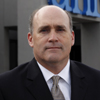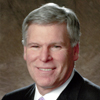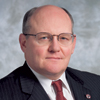Prescribing Change
Alumni leaders offer insights on the nation’s ailing health care system
By Richard D. Stanley
As the nation struggles to resolve its burgeoning health care crisis, prominent UB School of Management alumni say they are ready to take on the challenge of reinventing a system that would provide quality care for all Americans at an affordable price.
The challenge is great, these leaders say, but they and the nation are ready to implement wide-ranging reform.
“The U.S. health care system is very much like the political structure in the United States,” says June Hoeflich ’84, former president and CEO of Sheehan Health Network.

"The system suffers from years of putting Bandaids on problems to meet ever-changing demands. Health care is long overdue for overhaul."
June Hoeflich ’84
Former President and CEO
Sheehan Health Network, Buffalo
“The health care laws, regulations and practices are not only old and antiquated, but are also cumbersome, burdensome to navigate and ridden with bureaucratic constraints,” Hoeflich says. “The system suffers from years of putting Band-aids on problems to meet ever-changing demands. Health care is long overdue for overhaul.”
While the U.S. health care system is ailing, it is still among the most effective in the world, says Art Wingerter ’82, president of Univera Healthcare.
“There are far more stories of patients from around the world coming to the U.S. to get the latest state-of-the-art treatment than we see patients from the U.S. going elsewhere to get care,” Wingerter says.
Dr. Michael Cropp, EMBA ’03, president and CEO of Independent Health, adds, “The current system has not done enough to engage people in their own health. A higher level of personal involvement is critical to lowering the rate of chronic disease and controlling health care costs.”

"There are far more stories of patients from around the world coming to the U.S. to get the latest state-of-the-art treatment than we see patients from the U.S. going elsewhere to get care."
Art Wingerter ’82
President
Univera Healthcare, Buffalo
In laying out the challenge that confronts health care reformers, Katy Chiang ’80, CEO and president of Gramercy Surgery Center in New York City, sees the situation as complex and interrelated to other issues facing the nation.
“The current state of the American health care system is not an issue to be addressed from any single perspective,” Chiang says. “Changes will need to be made delicately, and the unintended but inevitable adverse effects of those changes will propagate themselves endlessly. It will be necessary to be constantly reminded of the social and economic repercussions of the changes we make and of the guiding principles that inspired us to make them in the first place.”
With Congress seemingly sailing on to some type of national health care reform later this year, School of Management alumni see a number of basic issues to be addressed.
“Are we serious about reducing costs or not?” asks Glenn Fosdick ’74, president and CEO of Nebraska Medical Center. “We need to make changes at the front end, lifestyle changes. For instance, 10 states still allow motorcyclists to ride without helmets. We have a significant smoking population. There are an inordinate amount of gunshot victims. If we’re serious, we need to make these basic lifestyle changes.”

"The current state of the American health care system is not an issue to be addressed from any single perspective."
Katy Chiang ’80
CEO and President
Gramercy Surgery Center, New York City
Univera’s Wingerter agrees. “We need people to take more responsibility,” he says. “We need to motivate people to focus on diet, exercise and healthy lifestyles. We need to get people to better manage their chronic conditions. It’s estimated that at least 50 percent of all health care expenditures are lifestyle-related.”
John Herman, EMBA ’06, is chief operating officer of South Buffalo’s Mercy Hospital and a major proponent of preventive care. “The current health care system is inappropriately skewed toward crisis management, treating patients after they become ill with specialized care,” he says.
Getting all citizens under some type of medical insurance umbrella is the key factor in health care reform, according to Cropp.
“While there are several challenges, probably the biggest challenge is achieving universal coverage,” Cropp says. “Rather than a single-payer system run by government, we need to build on the current system that involves and engages employers, government and individuals.
“The 46 million uninsured Americans who have fallen through the cracks of our health care system are generally people whose incomes are too high to qualify for Medicaid, but who don’t earn enough to pay the high premiums of direct-pay plans. It also includes people who are not able to purchase health coverage because of pre-existing conditions,” he says. “The expansion of existing government programs would help achieve universal coverage by providing assistance to people who are unable to afford health insurance on their own.”

"There is likely to be a federal plan offered as an alternative to private insurance since many private insurers refuse to cover highrisk populations or charge them rates that are unaffordable."
David F. Simon ’74
General Counsel and Senior Vice President of Payer Relations
Jefferson Health Systems Inc., Pennsylvania
David F. Simon ’74, general counsel and senior vice president of payer relations at Jefferson Health Systems Inc. in Radnor, Pa., sees some type of government intervention coming this year. “There is likely to be a federal plan offered as an alternative to private insurance since many private insurers refuse to cover high-risk populations or charge them rates that are unaffordable,” says Simon.
One of the issues that must be addressed is the nation’s aging population of baby boomers who will strain the health care system, he says.
“We need to fully fund our Medicare program and not cut it to address federal budget problems,” says Simon.
“In addition to strengthening safety-net programs, we need to make private health coverage more affordable by improving quality, enhancing efficiency and investing in technology,” adds Cropp.
Wingerter proposes establishing local panels that would oversee health care distribution to better balance affordability and quality.

"We need to make changes at the front end, lifestyle changes. For instance, 10 states still allow motorcyclists to ride without helmets. We have a significant smoking population. There are an inordinate amount of gunshot victims. If we’re serious, we need to make these basic lifestyle changes."
Glenn Fosdick ’74
President and CEO
Nebraska Medical Center
“I’d like to see the creation of regional health commissions comprised of key community stakeholders with the focus being on access, quality and cost,” he says. “The intent would be to have each locality establish its own entity that’s collaborative in its approach with a focus on building local consensus on key issues and best practices.”
Wingerter does not favor national, government-provided health insurance.
“It will mean a two-tier system of care with lower payments for physicians and hospitals—especially those treating people in a government-run plan. The result we’d probably see would be a migration of the best and the brightest from the health care sector to other areas where government price fixing wouldn’t apply,” he says.
The ideal situation would involve a compromise and embrace a partnership between government and private sector, Wingerter says.
Cropp also voiced his support for a joint approach to health care in the future.

"I feel that health care needs to be changed, but it needs to occur over time. If the changes are radical, I think there is the potential for more harm than good in the short run."
John Herman, EMBA ’06
Chief Operating Officer
Mercy Hospital, Buffalo
“The issues facing our community and nation can only be solved through a collaborative, team-based approach with the medical community, business community and government working together to find solutions,” he says.
Another factor to be considered, says Nebraska Medical Center’s Fosdick, is that private and public sectors must act to “head off a perfect storm” that could develop as substantial numbers of health care professionals retire while the education system can’t produce enough replacements. He points to the imminent retirement of many nursing instructors at the nation’s colleges as a potential problem. “We need to train and educate nursing instructors,” Fosdick says.
He also cites an alarming decline in general-practice physicians because most medical school graduates are choosing to enter specialized medicine.
“Perhaps the most significant problem with the health care delivery system is that the payment system does not function correctly. It does not focus on preventive care and positive health status,” says George St. George ’70, MBA ’71, CEO of Screven County Hospital in Georgia.
“It is the provision of uncompensated care that I think is the greatest challenge facing community hospitals today,” adds St. George. “Obviously, the uninsured who often constitute the medically indigent and charity care component receive the most media coverage and are the big blip on the federal government’s radar screen. However, the underinsured, as well as some of the uninsured, contribute significantly to the bad debt burden faced by hospitals today. People with high deductible health insurance plans are now joining the cadre of people with Medicare, Medicaid and private insurances that cannot or will not pay their copayments and deductibles.”
So where do these School of Management graduates see the nation’s health care system heading?

"Perhaps the most significant problem with the health care delivery system is that the payment system does not function correctly. It does not focus on preventive care and positive health status."
George St. George ’70, MBA ’71
CEO
Screven County Hospital, Georgia
“We need to leverage technology to create a modern health care system,” says Cropp, “where quality and effectiveness are rewarded, administrative efficiency is achieved and primary care and wellness are emphasized.
“An important first step to achieving this goal is to computerize the nation’s health records to reduce unnecessary and redundant services and wasteful spending,” he says. “The challenge, of course, will be to build and implement this type of system, as only about 8 percent of hospitals and 17 percent of physicians currently use computerized record-keeping systems.”
Chiang, of the Gramercy Surgery Center in New York City, looks at the health care predicament in practical terms. “The health care system is not perfect; it never has been and never will be. Perhaps it seems more flawed today than in recent memory,” she says. “However, there’s truly no relevant standard of comparison. At issue today is how best to manage a system, whether regulatory or proprietary in nature, so vast and so essential to society.
“Whatever changes are effected to address this difficulty, they will always be a step behind,” Chiang says. “There will always be room for improvement, and this is a fundamental characteristic of all business. In that sense, health care is, and will always be, a business.”
Cropp sees a bumpy road ahead, at least in the short term.
“Given the challenge of unsustainable cost trends and the pressures for timely reform, the health care industry will experience significant disruption,” Cropp says. “While technology will continue to proliferate on the care delivery side as well as the administrative side, those organizations that understand how to use technology wisely and manage the ‘high-touch’ aspect of health care in concert with the high-tech dimension, will be most successful.”

"Rather than a singlepayer system run by government, we need to build on the current system that involves and engages employers, government and individuals."
Dr. Michael Cropp, EMBA ’03
President and CEO
Independent Health, Buffalo
Mercy Hospital’s Herman urges a cautious approach to reform. “I feel that health care needs to be changed, but it needs to occur over time. If the changes are radical, I think there is the potential for more harm than good in the short run.”
Hoeflich, Sheehan Health Network’s retired CEO, anticipates wholesale changes for health care.
“The nation must undergo a radical modernization of its health care system, as with many other systems and industries,” she says. “The auto industry must, and is, changing. The financial industry regularly undergoes massive changes. I believe now is an opportune time to establish universal health care to cover the basic needs, and yet allow consumers and employers the option of purchasing added coverage.”
Wingerter, while acknowledging there is much work to be done to reform health care, says there is no cause for panic. His prognosis for the industry is for renewed health and vigor.
“I’m an optimist,” he says.
